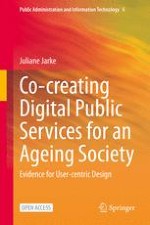This open access book attends to the co-creation of digital public services for ageing societies. Increasingly public services are provided in digital form; their uptake however remains well below expectations. In particular, amongst older adults the need for public services is high, while at the same time the uptake of digital services is lower than the population average. One of the reasons is that many digital public services (or e-services) do not respond well to the life worlds, use contexts and use practices of its target audiences. This book argues that when older adults are involved in the process of identifying, conceptualising, and designing digital public services, these services become more relevant and meaningful.
The book describes and compares three co-creation projects that were conducted in two European cities, Bremen and Zaragoza, as part of a larger EU-funded innovation project. The first part of the book traces the origins of co-creation to three distinct domains, in which co-creation has become an equally important approach with different understandings of what it is and entails: (1) the co-production of public services, (2) the co-design of information systems and (3) the civic use of open data. The second part of the book analyses how decisions about a co-creation project’s governance structure, its scope of action, its choice of methods, its alignment with strategic policies and its embedding in existing public information infrastructures impact on the process and its results. The final part of the book identifies key challenges to co-creation and provides a more general assessment of what co-creation may achieve, where the most promising areas of application may be and where it probably does not match with the contingent requirements of digital public services. Contributing to current discourses on digital citizenship in ageing societies and user-centric design, this book is useful for researchers and practitioners interested in co-creation, public sector innovation, open government, ageing and digital technologies, citizen engagement and civic participation in socio-technical innovation.
